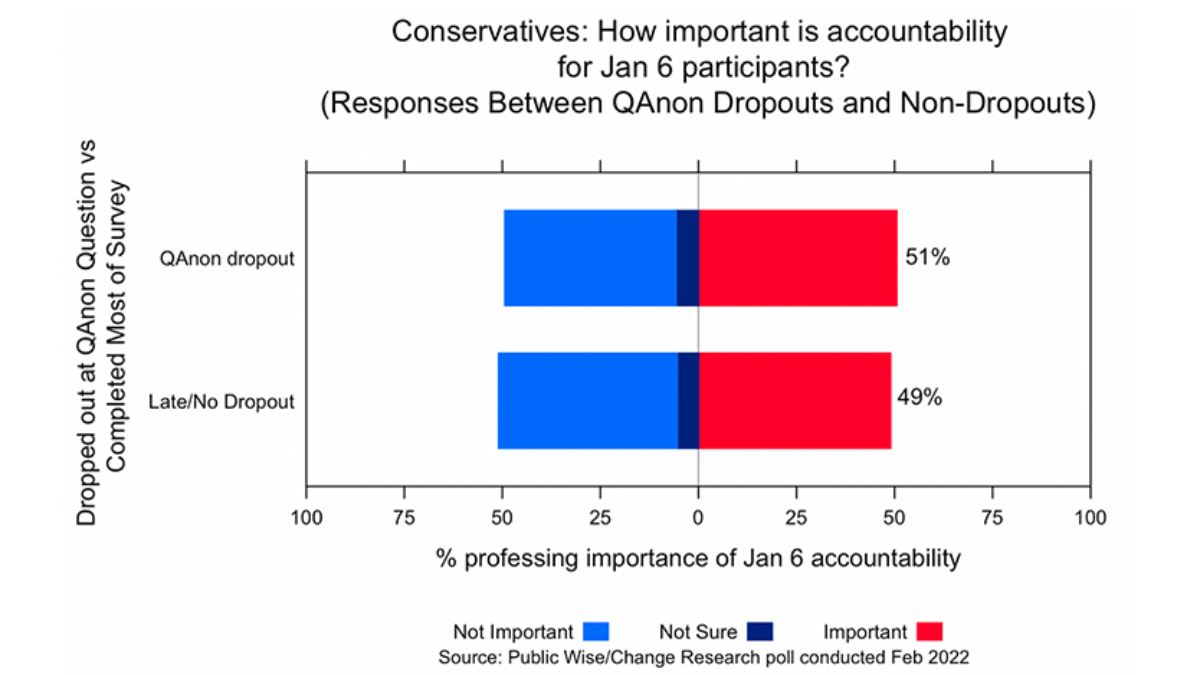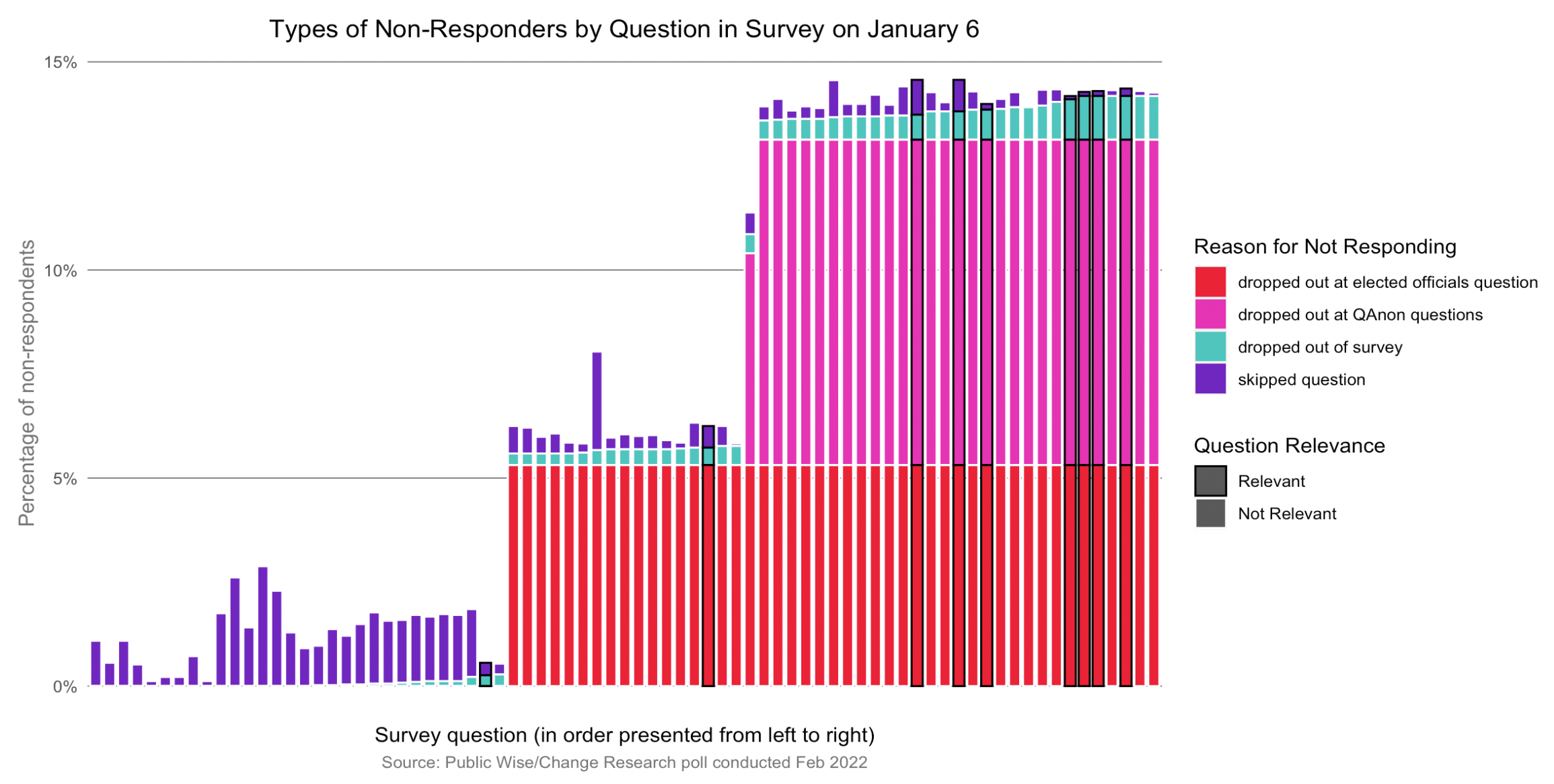Are Christian Nationalists the Base of the January 6 Movement?
The attack on January 6, 2021 is something many say is caused by a rising Christian nationalist movement. Christian nationalism is the belief the United States should be a Christian nation. It is rooted in conservative, White communities across the United States. For those who study the movement, the connection to the events of January 6 was apparent.
“…the Christian banners and flags, the wooden crosses, the impromptu praise and worship sessions, the “Jesus Saves” signs, the Christian t-shirts, and the infamous corporate prayer in Jesus’ name in the Senate Chamber. Having stormed the sanctum of American democracy, the “QAnon Shaman” thanked God for “filling this chamber with patriots that love you and that love Christ,” allowing them to send a message to their enemies “that this is our nation not theirs.” – Samuel Perry and Andrew Whitehead, Sociologists, TIME
The Christian right was an important part of the political base that elected Donald Trump into office in 2016. A 2018 study found Christian nationalist beliefs predicted Trump voters in 2016. In 2020, the same researchers found xenophobia and Islamophobia to be more influential in Americans’ plan to vote for Trump. Because of this, the use of Christian symbolism and language by those who stormed the Capitol was not surprising.
It is interesting to see the lack of formal religious organizations and leaders of megachurches in the attack on the Capitol. This fact raises doubts about Christianity inspiring the insurrectionists. This matches what those who study Christian nationalism are seeing in the recent changes. Church attendance has gone down and a growing number of Christian Americans do not claim a particular denomination. Instead, their unique, individualized beliefs are not part of official churches.
Scholars find Christian nationalists who don’t go to church are more likely to have voted for Trump in 2016 than those who attended services.
Did you know, Christian nationalists’ approval of the January 6 events grew over time?
From February to August 2021, the percentage of Christian nationalists who believed the rioters should be charged dropped from 75% to 54%. The percentage who said they stand with the rioters doubled from 13% to 27%.
In February 2022, Public Wise and Change Research ran a poll of 5,028 Americans to understand the influence of political movements and ideologies after the events of January 6. We asked about Christian beliefs, national beliefs, conspiracy theories, and other questions. Our research suggests Christian Nationalists are not actually the base of the January 6 movement.
The Difference between Christian Nationalists and Conservatives
It seems like Christian nationalist beliefs and the approval of January 6 seem to align. Almost all Americans who have Christian Nationalist belief self-identify as conservatives, but they only represent a fraction of conservatives in the U.S. We also know partisan views are a main factor for explaining Americans’ diverging views on January 6.
Public Wise asked a large set of questions. One key question was, “How important do you think it is that the people who participated in the events of January 6th be held accountable for their actions if a court determines they broke the law?” For self-identified progressives and liberals, support for accountability was almost unanimous. A small group of moderates did not believe accountability was important. Conservatives were split almost equally; half believed accountability mattered, the other half did not.
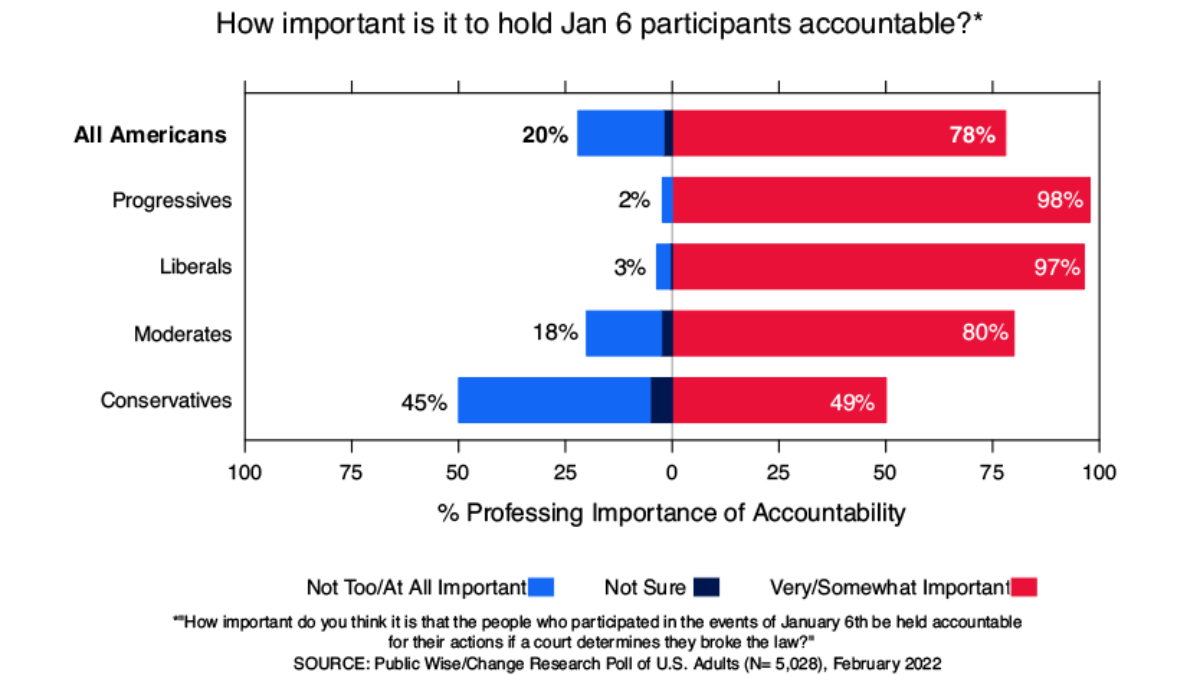
To better understand the role of Christian nationalism in January 6, we plan to study this data over time like Perry and Whitehead do. We also think it is important to compare Christian Nationalists’ attitudes with other conservatives.
Our data pointed to a divided conservative movement, at least when it comes to the events of January 6. What makes conservatives believe accountability is important? What makes them believe it’s not? We asked some questions on religion to determine what role, if any, Christian nationalism plays in shaping their views on January 6.
Not all Conservatives are Christian Nationalists
Religious Affiliations and Accountability
The likelihood of being a Christiaan is not equally distributed across the political spectrum in the United States. Christians of different denominations make up a larger share of conservatives than other political ideologies. (We classify Christian denominations as Roman Catholic, Evangelical or Born Again, Non-Evangelical Protestant, Mormon, and Eastern Orthodox).

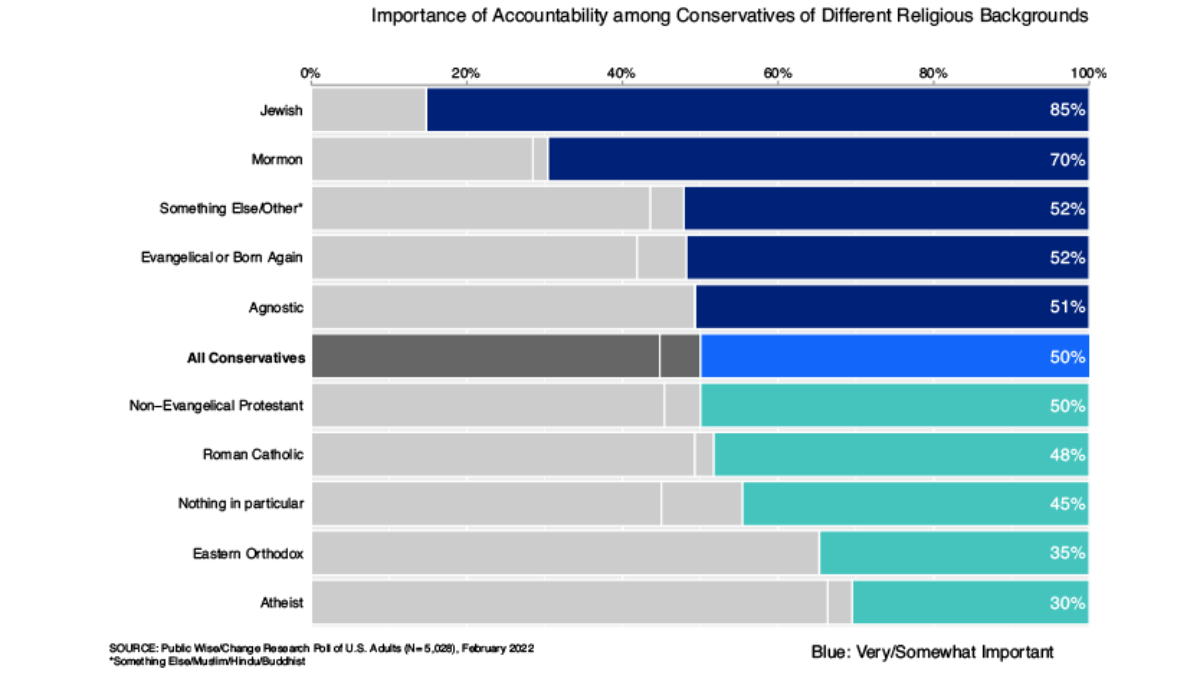
Christian Nationalism is not just about being Christian or holding Christian beliefs. There is no obvious pattern with Christian denominations and views on accountability within conservatives. Jewish and agnostic conservatives are more in favor of accountability than the median conservative. Mormons were also in favor of accountability. This is interesting because they are a group who mostly vote Republican.
Christian Nationalism and Accountability
We asked questions close to Christian nationalist beliefs. We followed questions used in the Baylor Religion Survey, the Public Religion Research Institute, and the Public Discourse and Ethics Survey. These are similar questions researchers of Christian nationalism have used (Whitehead and Perry, 2020; Perry, Whitehead, and Grubbs, 2022).
They included the following:
- In your opinion, how important do you think being a Christian is to being truly American?
- In your opinion, how important do you think believing in God is to being truly American?
- To what extent do you agree or disagree that the federal government should declare the United States a Christian nation?
- To what extent do you agree or disagree that the federal government should advocate Judeo-Christian values?
- To what extent do you agree or disagree that the federal government should allow the display of religious symbols in public spaces?
- To what extent do you agree or disagree that the federal government should allow prayer in public schools?
We used these questions to generate a scale of Christian nationalist beliefs ranging from 0 to 1, where 0 represents a total lack of Christian nationalist beliefs, and 1 represents the highest adherence to Christian nationalist beliefs.
Only 44% of conservatives received a high score for Christian nationalism using this scale (score of 0.8 or higher out of 0 to 1 scale). Those with the highest Christian national rankings were almost all conservatives.
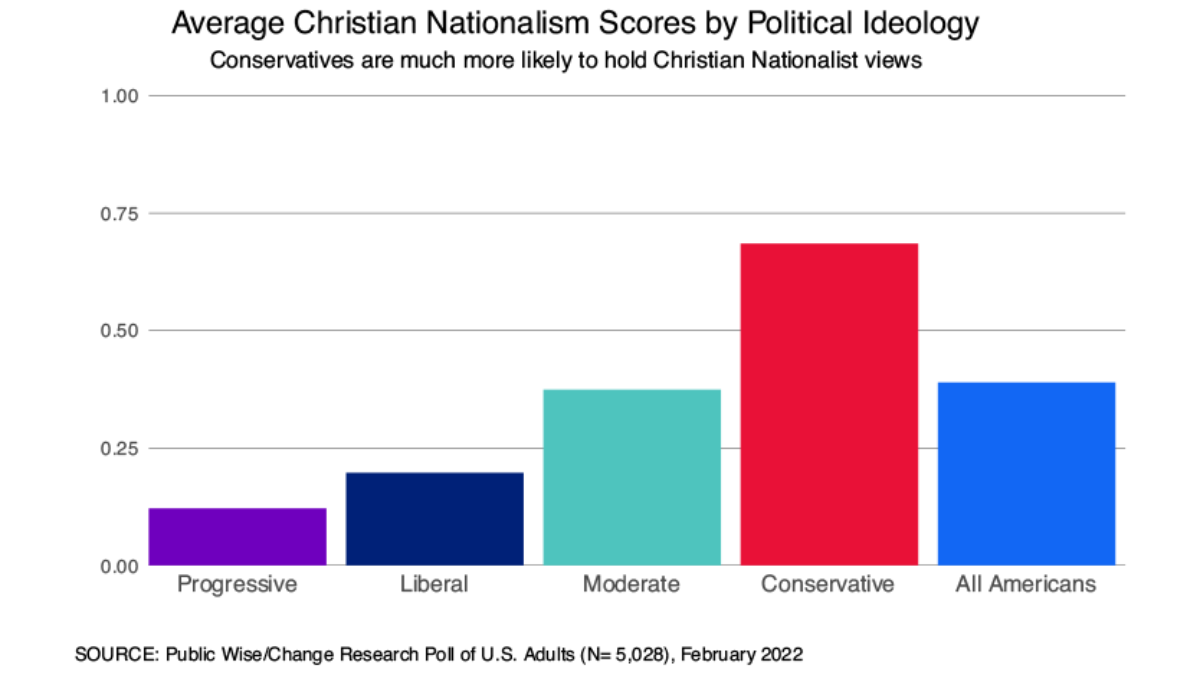
Below is a view of the pairwise correlation between holding Christian nationalist beliefs and views on accountability for U.S. conservatives only.
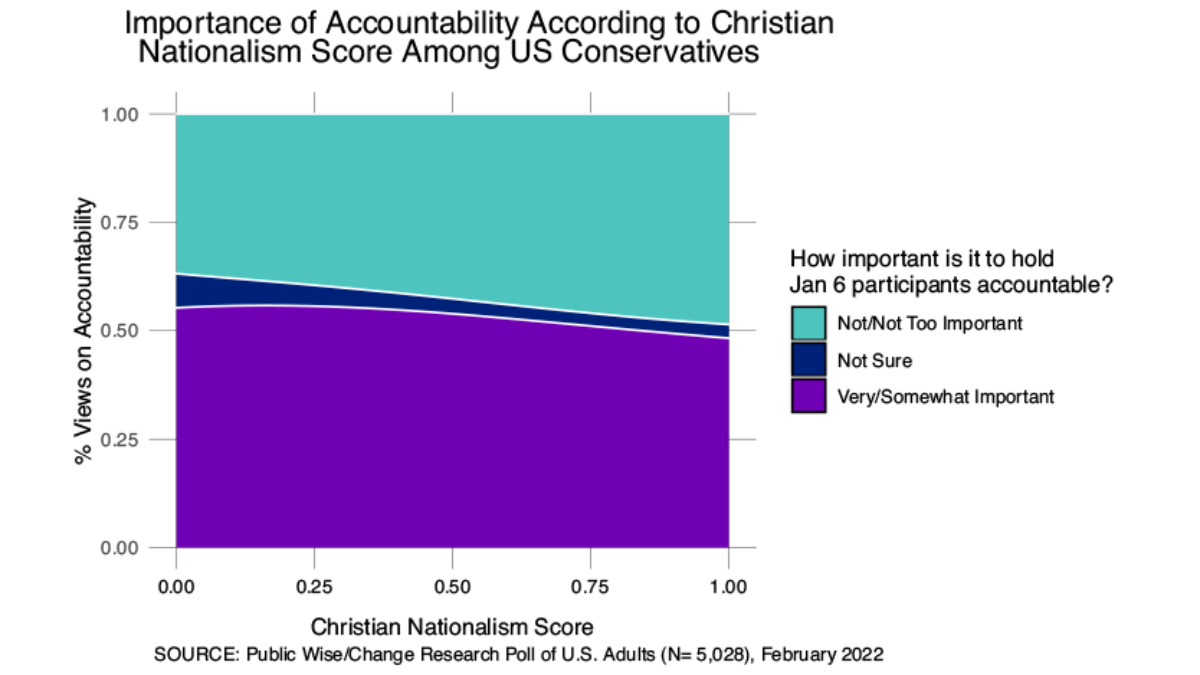
Conservatives who rate high for Christian Nationalist beliefs are less likely to believe accountability for insurrectionists is important. There is no big difference in views on accountability between the most and least Christian Nationalist conservatives: slightly over half of conservatives who scored 0 for Christian nationalism thought accountability was important compared to less than half of those who scored one (holding very extreme views on Christian nationalism).
Christian nationalism is weakly correlated with views on accountability on its own. In our white paper on views on January 6 accountability, a regression tree model did not identify Christian nationalism as an important distinguishing factor at all. Our regression tree model was able to account for Christian nationalism’s correlation with other ideological factors like belief in certain conspiracy theories.
These findings are not necessarily in contradiction to arguments made by sociologists of Christian nationalism.
They argue Christian nationalism brings together different political ideologies:
“Moral traditionalism rooted in hierarchical social arrangements…, authoritarian social control that justifies violence and militarism, and … strict ethnoracial boundaries surrounding national membership, civic participation and social belonging.” (Perry, Whitehead, and Grubbs, 2022).
“Christian nationalism has been linked with intolerant attitudes primarily through the merging of religious and other types of identities, such as ethnic and national identities, rather than through piety or traditionalism on its own.” (Davis, 2018).
Christian nationalism may be related to the growth of intolerant ideologies within the conservative movement. It does not appear to play a prominent role in shaping or explaining public beliefs around the Jan 6 attack on the Capitol.
Our study found factors other than Christian nationalism are more important for understanding the conservative divide in attitudes towards January 6. We will cover these more in future blog posts and you can read our complete findings and technical analysis in our white paper.
Notes on Missing Data
Respondents stopped answering questions at two politically sensitive sections of the survey. We chose not to exclude these respondents from our dataset. For more details about missing data, please read our post specifically on this topic.
For a visualization of where missing responses occur in the questions, see the graph below:
Quick Links
Those who dropped out of the survey at the QAnon questions did not go on to complete any of the questions related to ethnonationalism. We do not know these respondents’ views for these measures. Those who dropped out at the QAnon questions were more likely to self-identify as conservative.
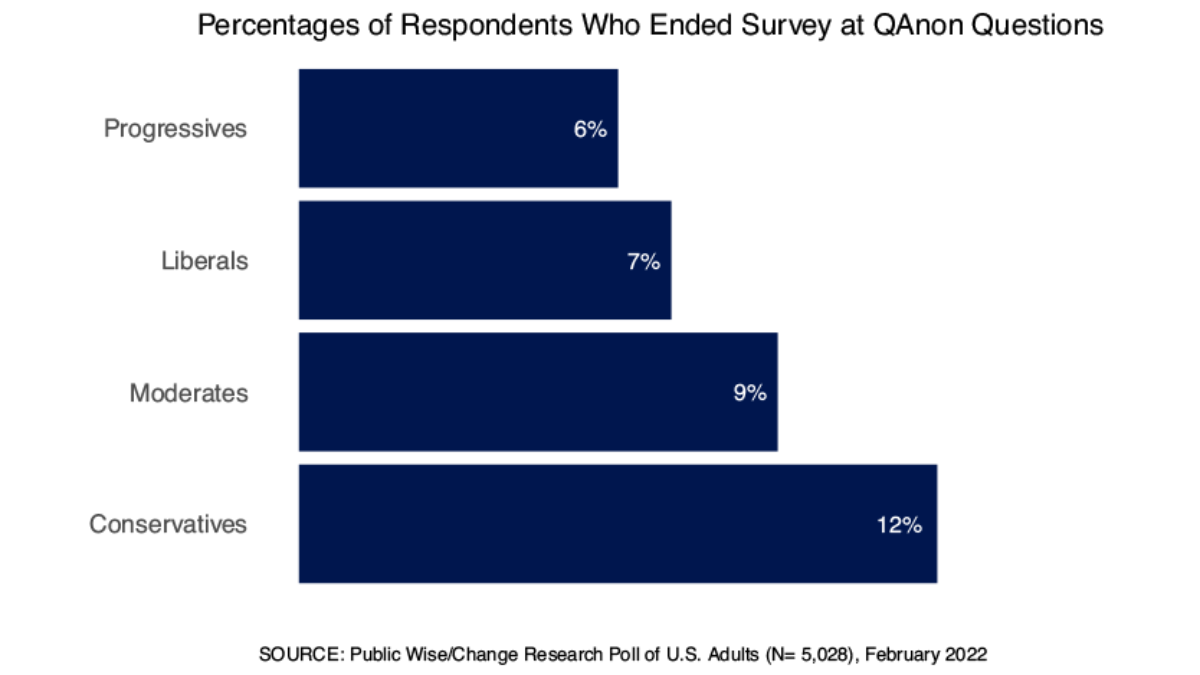
Conservatives who dropped out of the survey at the QAnon questions, their views on accountability are comparable to conservatives who completed most of the survey.
